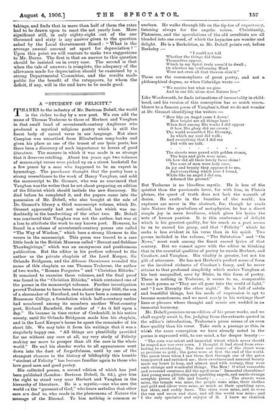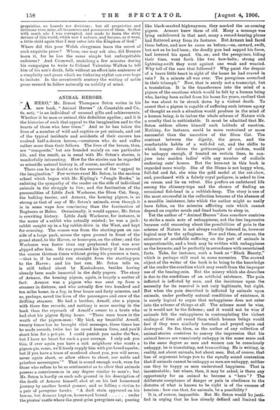A "STUDENT OF FELICITY." T HANKS to the industry of Mr.
Bertram Dobell, the world is the richer to-day by a new poet. We can add the name of Thomas Traherne to those of Herbert and Vaughan in that small band of seventeenth-century Anglicans who produced a mystical religious poetry which is still the finest body of sacred verse in our language. Not since Campion was unearthed from Elizabethan song-books and given his place as one of the truest of our lyric poets, has there been a discovery of such importance to lovers of good literature. The manner in which it was made is so strange that it deserves retelling. About ten years ago two volumes of manusoript verses were picked up on a street bookstall for a few pence by a man who happened to be an expert in hymnology. The purchaser thought that the poetry bore a strong resemblance to the work of Henry Vaughan, and sold the manuscript to Dr. Grosart, who was so convinced that Vaughan was the writer that he set about preparing an edition of the Silurist which should include the new discovery. He died before he completed it, and the papers came into the possession of Mr. Dobell, who also bought at the sale of Dr. Grosart's library a third manuscript volume, which Dr. Grosart apparently had not noticed, but which was un- doubtedly in the handwriting of the other two. Mr. Dobell was convinced that Vaughan was not the author, but was at a loss to attribute the work to any known poet. However, he found in a volume of seventeenth-century poems one called "The Way of Wisdom," which bore a strong likeness to the verses in the manuscript. This poem was traced to a rare little book in the British Museum called "Devout and Sublime Thanksgivings," which was an anonymous and posthumous publication. But the editor in his preface referred to the author as the private chaplain of the Lord Keeper, Sir Orlando Bridgman, and the Athenae Oxonienses revealed the name of this chaplain as one Thomas Traherne, the author of two works, "Roman Forgeries" and "Christian Etbicks." It remained to examine these volumes, and the final proof was found in the "Christian Ethicks," which contained one of the poems in the manuscript volumes. Further investigation proved Traherne to have been born about the year 1636, the son of a shoemaker of Hereford, and to have been a commoner of Brasenose College, a foundation which half-a-century earlier had numbered among its members another West-country poet, Richard Barnfield, the author of "As it fell upon a day." He became in time rector of Credenbill, in his native county, until Sir Orlando Bridgman made him his chaplain, and in the Lord Keeper's house he spent the remainder of his short life. We may take it from his writings that it was a singularly happy one. "All things are plentifully provided for me without any care at all, my very study of Felicity making me more to prosper than all the care in the whole world." He and his slender works to all appearances went down into the dust of forgetfulness, until by one of the strangest chances in the history of bibliophily this bumble "student of Felicity" has become familiar again to those who love good men and good poetry.
His collected poems, a second edition of which has just been published (London : Bertram Dobell, 35. 6d.), give him the right to stand very near Herbert and Vaughan in the hierarchy of literature. He is a mystic,—one who sees the world Es the "garment of God," who hears melodies that other ears ate deaf to, who reads in the phenomena of Nature the message of the Eternal. To him nothing is common or
unclean. He walks through life on the tip-toe of expectancy, listening always for the angelic voices. Christianity, Platonism, and the speculations of the old occultists are all blended into one creed, of which the keynotes are wonder and
delight. He is a Berkeleian, as Mr. Dobell points out, before Berkeley :— "I could not tell
Whether the things did there Themselves appear, Which in my Spirit truly seem'd to dwell ; Or whether my conforming Mind Were not even all that therein shin'd."
These are the commonplaces of great poetry, and not a philosophical dogma, as when Coleridge wrote :—
"We receive but what we give
And in our life alone does Nature live."
Like Wordsworth, he finds intimations of immortality in child- hood, and his version of this conception has so much resem. blance to a famous poem of Vaughan's, that we do not wonder at Dr. G-rosart identifying the writers :—
"How like an Angel came I down !
How bright are all things here !
When first among His works I did appear 0 how His glory did me crown!
The world resembled His Eternity, In which my soul did walk; And everything that I did see Did with me talk.
The streets were paved with golden stones, The boys and girls were mine, Oh how did all their lovely faces shine !
The sons of men were holy ones.
In joy and beauty they appeared to me, And everything which here I found, While like an angel I did see, Adorned the ground."
But Traherne is no bloodless mystic. He is less of the quietist than the passionate lover, for with him, in Plato's phrase, the quest of truth does not lack the warmth of desire. He exults in the beauties of the world ; his
raptures are never in the abstract, for, though he reads into Nature the symbolism of metaphysics, he has a direct
simple joy in mere loveliness, which gives his lyrics the note of human passion. It is this exuberance of delight which is his greatest quality, for his reach as a poet seems to us to exceed his grasp, and that " Felicity " which be seeks is less evident in his verse than in his spirit. Two poems included in the volume, "The Salutation" and "On News," must rank among the finest sacred lyrics of that century. But we cannot agree with the editor in thinking that in the essential qualities of poetry he excels Herbert, and Crashaw, and Vaughan. His vitality is greater, but not his gift of utterance. He has not Herbert's perfect sense of form or the involved richness of Crashaw's fancy, and he never attains to that profound simplicity which makes Vaughan at his best unequalled, save by Blake, in this form of poetry.
There is nothing in Traherne, it seems to us, comparable to such poems as "They are all gone into the world of light,"
and "I saw Eternity the other night." He is full of subtle and beautiful things, but his mode of expression is apt to become monotonous, and we meet rarely in his writings those lines or phrases where thought and music are wedded in an immortal harmony.
Mr. Dobell promises us an edition of his prose works, and we
shall eagerly await it, for, judging from the extracts quoted in
the editor's introduction, Traherne's prose seems of an even finer quality than his verse. Take such a passage as this, in
whisk the same conception we have already noted in the poems is expressed with, to our mind, a far deeper beauty :—
"The corn was orient and immortal wheat which never should be reaped nor was ever sown. I thought it had stood from ever- lasting to everlasting. The dust and stones of the street were as precious as gold ; the gates were at first the end of the world. The green trees when I saw them first through one of the gates transported and ravished me ; their sweetness and unusual beauty made my heart to leap, and almost mad with ecstasy, they were such strange and wonderful things. The Men ! 0 what venerable and reverend creatures did the aged seem ! Immortal cherubims! And young men glittering and sparkling angels, and maids strange seraphic pieces of life and beauty I The streets were mine, the temple was mine, the people were mine, their clothes and gold and silver were mine, as much as their sparkling eyes, fair skins, and ruddy faces. The skies were mine, and so were the sun and moon and stars, and all the world was mine ; and I the only spectator and enjoyer of it. I knew no churlish
proprieties, no bounds nor divisions ; but all proprieties and divisions were mine, all treasurers and possessors of them. So that with much ado I was corrupted, and made to learn the dirty devices of this world, which now I unlearn, and become, as it were, a little child again that I may enter into the Kingdom of God."
Where did this poor Welsh clergyman learn the secret of such exquisite prose ? Where, one may ask also, did Bunyan learn it, for he has the same simple but unforgettable cadences ? And Cromwell, snatching a few minutes during his campaigns to write to Colonel Valentine Walton to tell him of his son's death, falls without an effort into sentences of a simplicity and grace which no tinkering stylist can ever hope to imitate. In the seventeenth century the writing of noble prose seemed to follow naturally on nobility of mind.







































 Previous page
Previous page